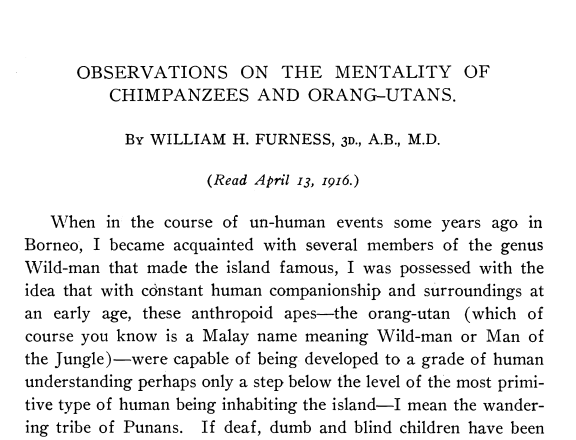Orang-outangs in the Greenhouse

Proceedings of the American Philosophical Society, 55 (1916): 281
In 2012, while browsing the local-history alcove at the Helen Kate Furness Library, I came across an interesting entry on the Furness family (central to the history of Heatherwold) in the second volume of A History of Delaware County Pennsylvania and Its People,, edited by John W. Jordon (New York: Lewis Historical Publishing Co., 1914). The entry begins with the declaration that the name Furness is “known wherever the English language exists in printed form” (p. 666), and at the time of publication, the family name was “worthily borne” by the three sons of Horace Howard and Helen Kate Furness: Walter Rogers Furness (1861–1914), Horace Howard Furness Jr. (1865–1930), and William Henry Furness III (1866–1920). No mention is made of their daughter, Caroline, possibly because she had died in 1909, several years before the book was published.
From the account of the life of the third son, William Henry, I learned that Heatherwold was once home to several species of primates:
Dr. William Henry Furness, third son of Dr. Horace Howard and Helen Kate (Rogers) Furness, was born at the family home in Wallingford, Delaware county, Pennsylvania, August 18, 1866, and there still resides. His early life was spent in Wallingford and Philadelphia, preparing for college in private schools. He entered Harvard University in 1884, whence he was graduated A. B., class of 1888. He chose the profession of medicine, entered the medical department of the University of Pennsylvania, receiving his degree of M. D., class of 1891. He spent some time in the University Hospital and at Johns Hopkins Hospital, Baltimore, but is especially distinguished as a traveler and writer. He has made six trips around the world, dwelling in many out-of-the-way places, gathering materials for his literary work. He is a member of the American Philosophical Society; the Societe de Geographie of Paris; Fellow of the Royal Geographical Society, London, and the Anthropological Society of Great Britain. He is the author of “Home Life of Borneo Head Hunters; its Festivals and Folklore;” “Uap, the Island of Stone Money,” and of many monographs of the American Philosophical Society. His clubs are the Rittenhouse and Oriental of Philadelphia.
Dr. Furness has never married, but maintains his residence in the family mansion at Wallingford [i.e., Lindenshade], situated in the midst of spacious grounds, made beautiful by the landscape gardener’s art. He is devoted to his literary work, and has many interesting experiments being wrought out at his country home. One of his theories is that the ape, monkey and chimpanzee can be taught a great deal beside useless tricks, and in carrying out his theory, he has two orang-outangs and a chimpanzee, in an apartment in his greenhouse, that he has taught most marvelous things, and which seem to bear out his theory that they possess an intelligence that can be taught to think and speak. (pp. 670–71)
His father, Horace Howard Furness, wrote about his son’s interest in primates in a 1 April 1910 letter to Owen Wister . William was 43 years old at the time.
I take a diluted interest in the daily round and trivial task, while Willie is still devoted to the development of his chimpanzee and Orang Utan, whose development is making such strides that I think Willie, having brought the latter to a knowledge of the alphabet as far as H, believes in his secret heart before long, the Anthropoid will compose a sonnet which will rival Wordsworth. It is to be addressed, I believe, to the Milk in the Cocoanut. (The Letters of Horace Howard Furness (Boston: Houghton Mifflin, 1922): 2:215)
William occasionally trotted one of the orangutans out for evening entertainment:
For the last ten days Willie and I have been alone, and every evening, when I smoke my cigar on the terrace, after dinner, Borneo is our court jester. Willie brings him forth and his ways and antics are certainly entertaining. (Letter to Mrs. C. C. Bartol, 28 July 1910, Letters, 2:230)